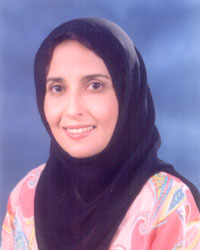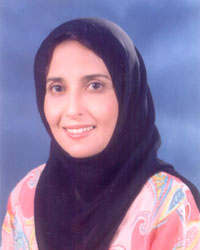
This is Amina (Part 2 of 2) [Archives:2006/921/Reportage]
February 16 2006
 |
This is the second part of Amina's story. Here, as told in her own words, we'll learn how her husband was murdered and how she was accused of killing him.
I was at home when my husband Hizam and his friend arrived. They talked about a problem between Hizam and Mohammed Ali Said Qaba'il (my husband's murderer). My father-in-law, Hassan Qaba'il, asked me to leave the room for fear I would tell others what they intended to do. Hizam also agreed that I leave them alone and go to the adjacent room.
He slept with his father and friend that night. When asked why, they said they had to write some documents for Qaba'il. In the night silence, I could hear them talking. I discovered that Qaba'il had ill intentions and was planning to They disputed with Mohammed Qaba'il over some money.
In the morning, my father-in-law Qaba'il asked them if they had fulfilled what they agreed upon, but they replied they would fulfill it the next night. I told Hizam that I heard them talking the previous night, but he said they were just kidding and asked me to keep it secret. He promised to buy me a new dress and be sweet if I kept the matter secret. However, he did not fulfill his promise.
Two days later, I went to Mohammed's father and told him all I had heard. I went with him to Al-Tawela city in Al-Mahwit governorate where he bought me clothes. The next day (Friday), people gathered and Mohammed told them what Hizam and his father Qaba'il intended to do. He also held them responsible for any harm to his sons. Hizam and his friend were afraid.
A week later, while sitting in the mosque for iftar, a problem ensued between Hizam and Mohammed over dates. Hizam threw dates at Mohammed's face and then they all left. Hizam spent much of his time at his sister's house.
One day, his enemies came to me to learn the time of his coming home. When Hizam arrived, I told him about them, but he asked me not to tell his father Qaba'il. He asked me to leave the door open because it was hot, then he went to bed. We used to leave the door open every now and then, but this time when I opened it, by chance I faced ho came in and murdered Hizam by suffocation.
It was too dark for me to see, but I heard something going on in the room. I switched on the light, saw and shouted. One of them covered my mouth and tried to tie me up. I began to resist but they hit me. They threatened they would accuse me of killing Hizam. I didn't know about women's prisons or death sentences because I was a child.
When my father-in-law searched for Hizam, he found him in the mosque's well. They thought he died naturally, but his sister doubted it. The Sheikh sent the village youths, including me, to the Investigation Bureau (IB). My father accompanied me.
Mohammed's father sent a girl to threaten me if I told the IB about the incident. The IB head handed me over to my father, as he found no evidence. I told them I did not like going back to Hizam's home. I also told them how my husband died and who killed him.
The other youths were released while Mohammed and I remained there. During the investigation, I was assured they would set me free. I remained there three days and when the accused (Mohammed) learned that I told the IB about the incident, he confessed that I was his partner in killing Hizam, which was not true.
The IB manager fabricated a story that I was in love with Mohammed, asking him to write that I murdered Hizam and was in love with him. I was a child at the time and did not understand what they intended to do. I was just thinking of returning home. Mohammed was shackled in three cuffs to confess to having a relationship with me.
The case file was referred to Prosecution, which began investigating Mohammed. But as for me, a Prosecution member came to interrogate me and asked me to sign my fingerprint on the record. I had no lawyer and my father assured me there was no Prosecution torture and that the situation there was better than the IB.
My trial continued for a year, after which my case was withheld. The judge was ordered to postpone issuing my judgment. His secretary then replaced him. He retried my judgment for six months. I unexpectedly was sentenced to death. I was shocked and threw a chair at the judge's head. I fainted and then they took both of us to the hospital. There the judge swore he would commit himself to upholding the death penalty to take revenge on me or else he would not be a judge.
Prosecution was sympathetic, offering me an appeal petition before the Court of Appeals. I was stressed psychologically and began a hunger strike. The Court of Appeals head visited me at the women's prison. I was brought to a hospital to determine my age and a decision was issued that I was young. This ran counter to the previous decision that I suffered from hysteria. Prosecution was aware of my miserable situation. But the appeal judgment ignored Prosecution's decision and upheld the first sentence. Thus, the judge proved himself a real judge. The Supreme Court also upheld the death sentence. My life came to an end.
I managed to escape from prison twice with the help of some who felt I was being oppressed. The first time I escaped, I was arrested and returned to prison. The second time, I escaped to my family, which fearfully received me. My brother told my father that I escaped from prison. He asked him whether to return me to prison or allow me stay. My father told him to wait until he came home.
My father arrived with the village sheikh, my uncle and my cousins. They took me by car and handed me over to Al-Mahwit's governor. I was then sent to Central Prison in Sana'a. I came to learn that Hizam's family wanted to implement my death sentence and forgive Hizam's murderer.
I was brought to Al-Mahwit governorate in 2002 for my scheduled execution and placed before the firing squad. In that moment, I recalled the time when I was a child, deprived of childhood and education, when I married without knowing what married life was. I remembered being wedded to death, with my mother weeping for me; escaping into the mountains and fainting; my father-in-law Qaba'il punishing me by putting a black substance onto my eyes and getting pregnant with my first child. At that time, I was indeed a child needing a mother's care.
Alas, for my daughter, I wish I could see her and caress her. I wish she could have a doll and be educated. I wish she will not marry at age 9. I wish she will know I am a victim and have been oppressed.
As I was placed before the firing squad, I felt my feet were very heavy as I saw death. Why? I was innocent. I did not kill Hizam, nor was I a partner in murdering him either. But who would believe I was innocent? No time to discuss. My life came to an end. How would I die then?
Hizam's murderer and I were asked to lie down on the ground to be executed together. I asked them to execute me after executing Hizam's murderer, because I realized the Qaba'il family would forgive him.
I told them I was pregnant. They didn't believe me, but the judge insisted on making sure whether I was pregnant or not. I was taken to the hospital, where examinations showed I was pregnant in my third month and three weeks. Some insisted on executing me, justifying that the embryo had not matured yet. The judge and the Appeals Court judge decided to return me to prison. I was given a stay of execution until my baby reaches age 2.
I spent nine years in prison, six at Al-Mahwit Prison and three at Sana'a Central Prison, where women are taught to read, write and sew. All women prisoners study, but I cannot be like them because I must look after my son.
I know I will die. I die slowly every day. I have fasted every day except Sunday and Friday since I was sent to prison. I pray to Allah every day to save my life from this blight. I wish I will be set free and take my daughter because there is torture in Al-Mahwit. I do not want to live in Al-Mahwit again. I wish I could do something for her and for my son. My family used to visit me in Al-Mahwit Prison, but in Sana'a Prison, my parents only visited me once.
That was the story of Amina Abdullah Ali Al-Tuhaif, born in Hijrat Bani Al-Abbas, Al-Mahwit governorate. She is now 22 years old. She is the second child in a family of five sisters and one brother. All her family members are illiterate, except her elder brother.
Amina has two daughters, Arham and Amani. Arham died at age 6 in a car accident. A prison guard raped Amina and as a result, she gave birth to a boy named Nassar.
When I visited her at Central Prison, she asked me to buy her a bike so she could rent it to prisoners' children and get some money. When a woman asked her to sell sweets in the prison, she ate them instead, an indication of the fact that Amina still was young and deprived of childhood rights.
When she told me about her case, I went the Prison Department where I learned that President Saleh had commuted Amina's death sentence. I told her this news and she believed me. She still was imprisoned on my second visit, so I thought it was a matter of payment. When I followed up her case, a prison employee told me the information I got was untrue.
In conclusion, this is Amina, a wife and mother accused of killing her husband Hizam. She is beautiful, simple, kind, poor, innocent, oppressed and clever. I respected her wish not to publish her photo in newspapers or magazines because she is “a daughter of village and traditions” and her family may get angry to see her photo published. Her family already executed her when they deprived her of education and childhood and forced her to marry as a child.
I remember the words of the head of the European Union Commission when he said to me, “I follow up the cases of all Aminas.”
Shadha Mohammed Nasser is a Supreme Court lawyer.
——
[archive-e:921-v:14-y:2006-d:2006-02-16-p:report]


